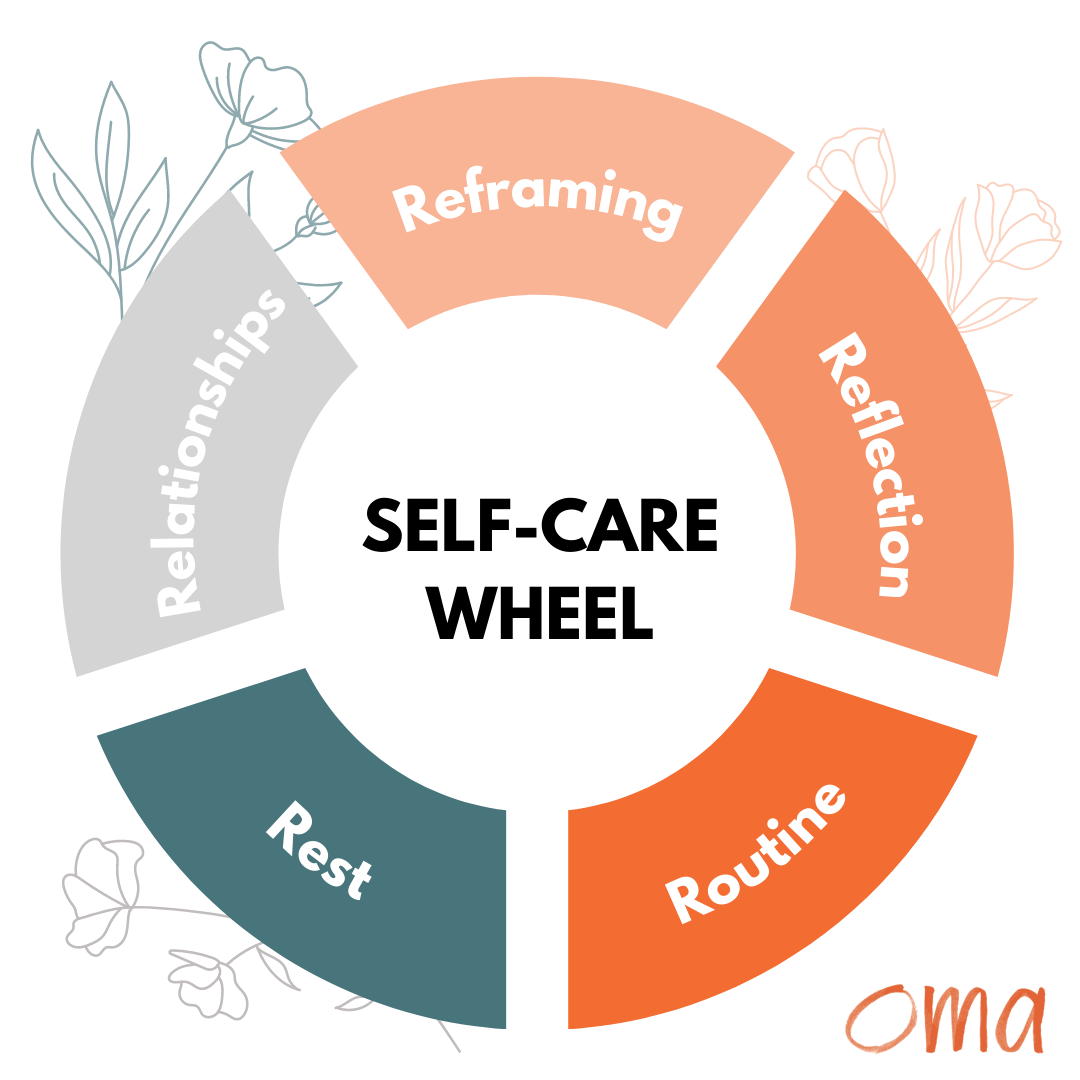Rethinking Self-Care
Lately, there has been a lot of talk at OMA about the term ‘Self-Care’ and why it no longer feels good as a recommendation for most people we work with. Offering up the idea of self-care may come with the best intentions, but we have to be mindful of how that lands for each person. For some of us, self-care makes us think of an hour-long walk or a relaxing bubble bath—and not having the resources or childcare to pull that off can bring on feelings of shame or guilt. For others, it may leave us wondering why self-care isn’t the "solution" that we need it to be because we are actually dealing with a mental health issue. And many of us also fall into the category of feeling like self-care is something we can only have if everything else is done; otherwise, it comes with more feelings of guilt.
Self-care now seems like yet another place where we are falling short. We see images of people with beautifully curated self-care routines and begin to wonder why ours look different or seem impossible to achieve. It becomes another place where we "should be", rather than tapping into ourselves and finding out what we actually need to feel better.
In our search to find out what happened to Self-Care, we came across this article by Erlene Grise-Owens, EdD, LCSW, MSW, MRE, lead co-editor of The A-to-Z Self-Care Handbook for Social Workers and Other Helping Professionals.
What we loved about this article was the cool graphic, and also the opportunity to broaden our understanding of Self-Care and make it less about products we purchase and more about what is essential for wellness in our lives.
After studying, promoting, and practicing self-care for over a decade, Erlene combined five ‘R’ ingredients essential for effective self-care.
Reframing: Rather than seeing self-care as activities that need to be blocked out after work and/or as an escape, we start to see self-care as part of a holistic lifestyle. This may also include reframing one's perspective to include mindfulness or gratitude practices in your day.
Reflection: Instead of focusing on the DOING of self-care, we might first want to start with intentional self-awareness/reflection. Not only could this be a way to tap into our dreams, values, and beliefs, it may also be the start of creating a more meaningful self-care strategy. Take some time to figure out what fills your cup!
Routine: Our overall well-being is greatly affected by the small habits that accumulate through the day. Where might we be able to incorporate some rituals that support our well-being into daily life? One example might be putting screens away one hour before bed (easier said than done!)
Rest: This can be challenging because so many of us have our worthiness tied up in our productivity. Resting—which includes play, sleep, relaxation, and creativity—can bring on guilt because we feel we are not being useful. Some of us really ARE in survival mode, and it feels impossible to even think about rest. This might be another place where we can reflect on our daily routine and see if there are places we can incorporate a bit of rest, creativity, play, fun, or even asking for help. If not, are there ways we might improve the quality of sleep we have at night?
Relationships: We loved seeing boundaries and connection to SELF as part of self-care. The relationship most often neglected, especially for those in caregiving positions, is the one with ourselves. When this happens, we can often see self-care as selfish, making it hard to feel confident when setting boundaries. Learning to have separation in our relationships, and discovering who we are and what brings us joy, can help us get back that sense of worthiness that makes boundary setting possible.
One thing we wanted to add, maybe to Reframing, is the idea of letting yourself off the hook during these really challenging times. Nobody is as perfect as what we see on social media; most of us are just trying our best to get through the day. Changing how we talk to ourselves and offering ourselves some grace and compassion could be a beautiful act of self-care.
We would love to know how you would answer: What does self-care look like for you? Is this something that feels impossible and just another thing on the to-do list? Or is it something you are striving to add to your life?


